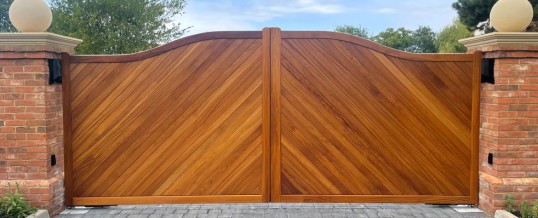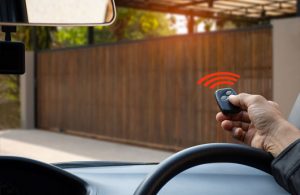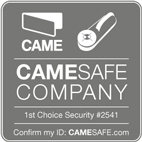
What Gate Automation Options Are There?
Automatic gates are now integrated into our everyday lives. They’re to be found outside schools, businesses, car parks and residential driveways. But how do automatic gate systems work? In this article the 1st Choice team goes through the components that make up an electric gate system, and we consider the range of gate opener options.
 What is Gate Automation?
What is Gate Automation?
Manual gates comprise wooden, steel or aluminium gates that have to be opened by physically pushing or pulling them. Automatic gates open in response to a remote control, keypad or key fob. They’re driven by a motor which operates the gate openers. Also included in automatic gate systems is a safety device that halts the gate should a person or obstacle be detected in its path.
Automatic Gate Openers – A Range of Options
When 1st Choice engineers make their initial site visit to discuss the design and installation of automatic gates, they’ll discuss gate opener options:
1. Hydraulic Ram Motors.
This is the standard gate opener we use when installing swing gates. It is made up of a long thin motor which is attached to an anchor point, such as a gate pillar. The motor contains a hydraulic fluid reservoir which is pressurised in order to close the gate and reduced retract the arm and open the gate.
2. Articulated Arm Motors
This motor is mounted, in a casing, onto the gate post, or equivalent, whilst the other end of the arm is fixed to the gate. The opener is hinged, and when the gate opens the arm moves in the manner of an elbow joint, to pull or push the gates open or shut.
3. Linear Screw Type Motors
These look rather like ram motors but instead of working hydraulically, the motor works by spinning a threaded shaft inside the long, thin casing. The action of the threaded shaft, screws a bracket attached to the gate up or down the shaft which opens or closes the gate as a result.
4. Underground Gate Openers
These gate openers are extremely popular because the mechanics of opening or closing your automatic gates is completely hidden. The motor is housed in foundation boxes which are placed in pits below the gate hinges. All that is visible is the lid of the foundation box and the motor arm which is attached to the underside of the gate. The motor rotates the arm to open or close the gate.
5. Sliding Gate Motors
Sliding gates are ideal for shallow, inclined or particularly wide driveways. In order to create an elegant sliding operation, the sliding gate opener is housed in an oblong box, with only the output shaft visible. This has a toothed cog mounted on it. When opening or closing the gate, the cog needs to mesh with the rack situated on the back of the gate. It is the rotation of the cog that pulls the gate open.
 Automatic Gate Systems Controls
Automatic Gate Systems Controls
One of the attractions of automatic gate systems is the ease with which the gates can be operated without leaving your vehicle. This operation depends upon a remote control or fob, or a remote keypad requiring a code for opening the gate. Once the gate motor receives a signal from the remote device the gates will open and then close to order.
Safety Controls on Automated Systems
It’s always a concern – especially when installing school security gates – that an automated system may not be entirely safe as they cannot react quickly to non-standard situations. There are two kinds of safeguard that can keep gates from causing harm to people, animals, or vehicles:
- Photocell Sensors. These are installed in pairs on either side of the gate. They send infrared beams across the width of the gate. If this beam is interrupted in any way, a signal is sent to the motor operation and the gates will stop in their tracks. Once the obstacle is cleared, the gates will continue to operate as normal.
- Rubber Safety Edges. These are used on sliding or swing gates. The rubber profile has a contract strip in the middle. If the rubber makes any kind of contact the gates will automatically stop. The gates will then reverse their action to minimise the potential for crushing or any other kind of damage.
Why Choose 1st Choice Security Systems
Whether you’re installing automatic gates for your home or for a commercial location, 1st Choice engineers can offer advice informed by our experience of working across a range of different environments. Our twin priorities are always the safety and security of the property and people the gate is designed to protect, and automatic gate systems that suit the function and aesthetic requirements of your installation.
1st Choice Security Systems knows how important it is to be able trust installers installing electric gates. All our engineers are DBS checked, SafeContractor approved, SSAIB approved, and we’re a DHF member. We work to the ISO2001-2015 standard. Should you need us in an emergency, we are available 24 hours.
In need of CAMESAFE CCTV systems?
Our CAMESAFE Installers have vast knowledge and experience to be able to offer the required security solutions and automation safety for all our security systems.
Would you like to speak to a 1st Choice engineer about installing automatic gates on your driveway or premises in Beds, Bucks, Herts or North London? Call us today on 0800 118 2414
MAY


